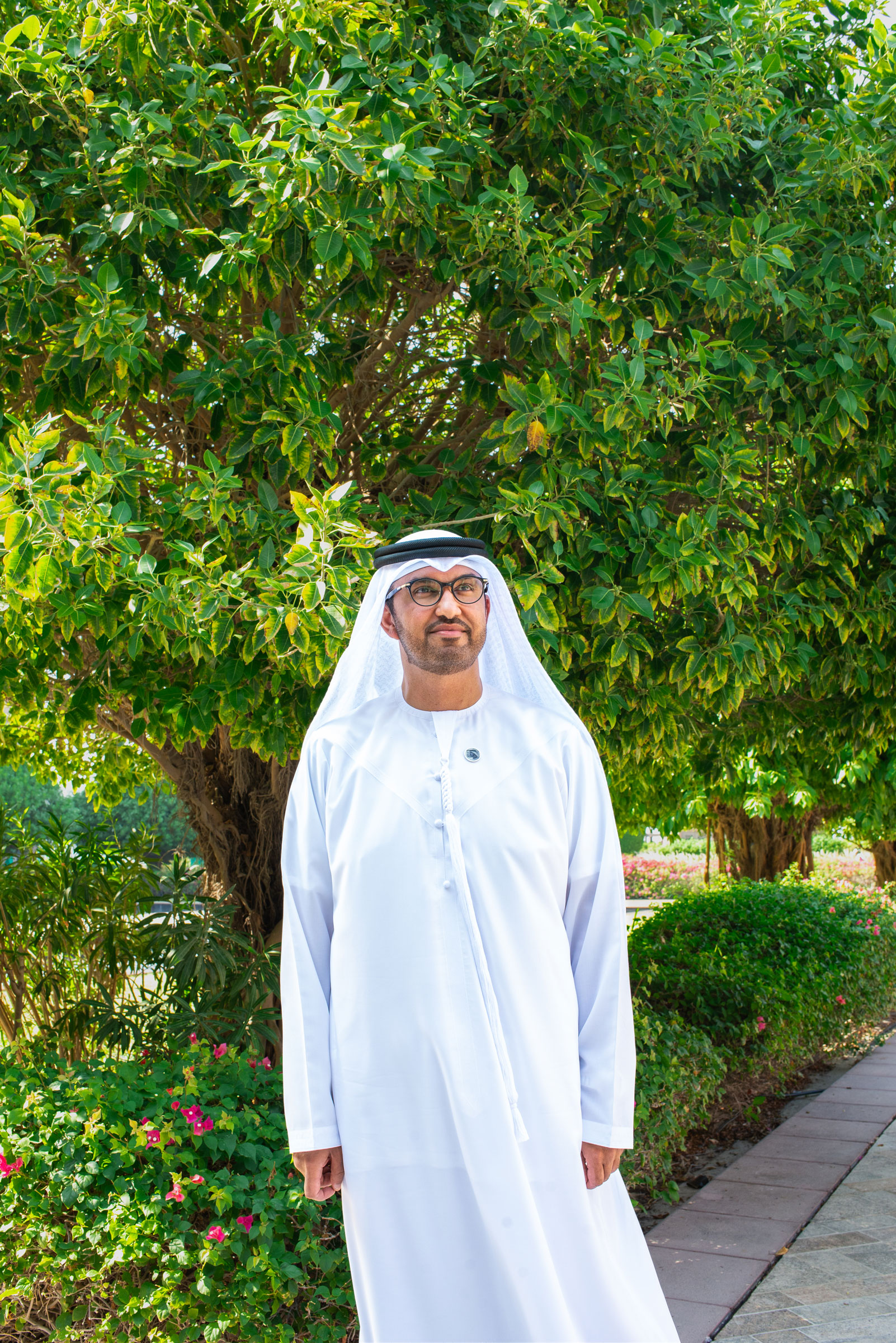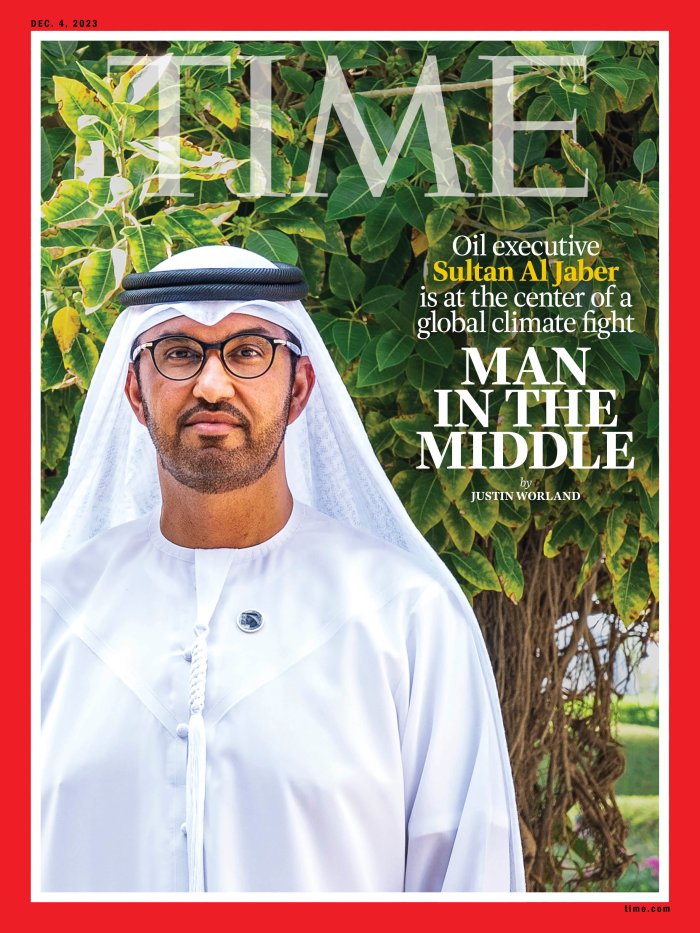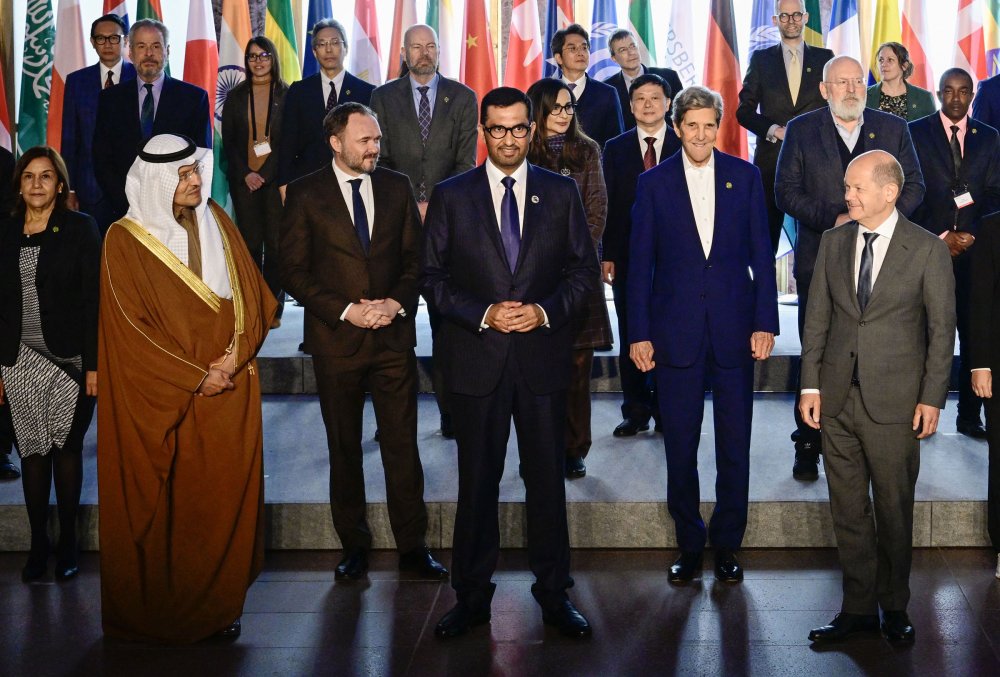
For a taste of the United Arab Emirates, try the cappuccino at Abu Dhabi’s Emirates Palace hotel. At around $25, it’s a quality cup of coffee, but the gold flakes that come sprinkled on top are its primary selling point. Every turn in the Palace, one of the most expensive hotels ever built, radiates opulence: marble from floor to ceiling, more than 1,000 crystal chandeliers, gold trim, and a choice of Michelin-starred restaurants on site.
[time-brightcove not-tgx=”true”]Just across the street is the source of the immense wealth that created this place, and transformed the UAE from a desolate patch of desert to a country with a higher GDP per capita (adjusted for purchasing power) than the U.S.: the Abu Dhabi National Oil Company, or ADNOC. In contrast to the lavish hotel, the glass skyscraper is polished but efficient, the offices corporate, almost austere. Employees and visitors dress modestly, following the 13-page dress-code manual I received ahead of my visit.
I traveled to Abu Dhabi in late October, not to sip gilded cappuccinos, but to interview Sultan Al Jaber, the Ph.D. economist turned renewable-energy executive turned ADNOC CEO, who is presiding over the U.N. climate conference to be held in Dubai in December. The conference, known as COP28, comes as, at the close of the hottest year on record, scientific consensus demands that we cut fossil-fuel use right now. At the same time, money continues to flow into fossil fuels; more than $1 trillion in new funding was invested this year alone, according to the International Energy Agency (IEA).
Al Jaber, as the head of both COP28 and one of the world’s largest fossil-fuel companies, is tasked with reconciling those realities. Sitting in a meeting room at the Emirates Palace hotel dressed in the traditional white thobe and sneakers, he is both a target for criticism and a symbol of possibility. “A phasedown of fossil fuels is inevitable, it is essential,” he tells me. “We have to accept that.” At the same time, he says, the world is not ready to entirely kick oil and gas. “We need to get real,” he says. “We cannot unplug the world from the current energy system before we build a new energy system.”

Most years, the COP president plays a largely functionary role, shuttling between member countries to find common ground on wonky areas of climate policy. Al Jaber has taken a very different approach. He has extended an invitation to oil and gas companies and prioritized private-sector climate solutions. In Al Jaber’s view, the success of COP28, not to mention the broader efforts to fight climate change, hinges as much on embracing the private sector and shifting market conditions as it does on wonky negotiations. “There’s going to be a paradigm shift,” he says. “The political process needs to be well complemented with private capital and a business mindset.”
Success is far from assured. A “business mindset” doesn’t necessarily map well onto diplomatic negotiations between 200 countries. And companies—especially those in the oil and gas business—do not have a great track record of following through on climate commitments. Critics from Greta Thunberg to Al Gore say Al Jaber is just a stalking horse for the fossil-fuel industry’s continuing efforts to stall the global climate agenda. Al Jaber says he’s uniquely positioned to reconcile the many interests in the climate fight.
That debate will define the coming COP summit. We need to begin to phase out oil and gas while managing the continued dependence of our economic system on fossil fuels. Al Jaber’s not wrong that that requires cold-eyed realism, but no one knows where his version of realism will lead. In Abu Dhabi, I sat down with John Kerry, the former U.S. Secretary of State now serving as President Biden’s climate envoy. He has been supportive of Al Jaber from the beginning, but acknowledges the difficulties. “It may or may not work,” says Kerry. “Some might call it an experiment to have an oil-and-gas-producing entity host COP. That’s the big question.”
Looking out the window of the Bell 412 helicopter ferrying me out of Abu Dhabi, I get a glimpse of the classic vision of the Arabian Desert: a sea of wavy sand dunes stretching as far as the eye can see. Visible through the other window is a science-fiction-like array of solar panels, covering an area larger than Manhattan. Tracing the border of the solar park, we descend to get a closer look at the nearly 900-ft. tower loaded with molten salt that absorbs and stores the energy from the 70,000 mirrors that surround it.
Al Jaber’s team arranged the ride to Mohammed bin Rashid Al Maktoum Solar Park, among the world’s largest, to showcase the UAE’s climate work. As impressive as the solar farm is, I’m just as intrigued by the ride to the site. We lift off from a helipad in Abu Dhabi, getting a stunning, if brief, view of the skyscrapers that have emerged from the desert that 60 years ago was an impoverished community suffering from the decline of the pearl-diving trade. From there, we fly over the Persian Gulf, where I can spot some of the UAE’s offshore oil rigs in the distance, contributing to the nearly 3 million barrels of oil the country produces every day.
Read more: Why Renewables Are Key to COP28 Success
Al Jaber is at the center of this energy ecosystem. At age 50, the bespectacled executive runs ADNOC and serves as the chairman of Masdar, the state-owned company he co-founded that now operates renewable-energy projects in over 40 countries. When we sit down, he addresses me warmly, and jumps right into his résumé. He was appointed to run ADNOC in 2016, he says, months after the world had inked the Paris Agreement, in part to “future-proof” the business amid the global transition away from fossil fuels. “They wanted a smart, progressive disruption,” he says.
Progressive is a relative term. Al Jaber hasn’t committed ADNOC to cutting its oil production, nor has he charted a path for it to become a renewables company. Instead, the company is investing more than $150 billion on growth projects, including expanding its crude-oil production capacity to 5 million barrels per day by 2030. A fraction of that money, $15 billion, is dedicated to reducing the emissions that oil extraction will generate. That said, it has led to some improvement: Offshore oil rigs now run on electricity, and digital tools allow the company to map areas where energy is wasted. And the company has begun building big-budget carbon-capture projects.

As COP28 chief, he has called on other oil companies to come to Dubai with similar commitments to crack down on leaks of methane, a potent greenhouse gas, and to decarbonize their own operations. “If it wasn’t for what I’ve been able to do, and demonstrate to everybody in this industry, I wouldn’t be in a position to convince them,” he says. The conversations haven’t been easy, with some state-owned oil companies in particular resisting aggressive proposals.
Al Jaber describes his approach as “realism.” Oil is in high demand, and even in the most aggressive decarbonization scenarios, we will still need some supply by the middle of the century. He argues it’s best that whatever oil we use has the lowest carbon content available. That’s especially important in the UAE and Saudi Arabia, where oil is so cheap that it will likely remain in the global energy mix longer than oil from anywhere else.
Decarbonizing oil and gas is certainly insufficient, and some argue that it represents a fig leaf for the industry. The sector’s operations represent 15% of global energy-related emissions, but the real problem is the product they’re selling. In September, a U.N. assessment stated that “phasing out all unabated fossil fuels” would be “indispensable” to keeping the Paris Agreement goals within reach.
So it’s unsurprising that the criticism of Al Jaber, as a leader of a fossil-fuel company, has been unrelenting. More than 100 members of the European Parliament and the U.S. Congress declared in May that Al Jaber had “severely jeopardized” the COP process and called on him to resign. This summer, Gore said in a TED talk that fossil-fuel interests “have brazenly seized control of the COP process.” Of Al Jaber, Gore said, “He’s a nice guy. He’s a smart guy. But a conflict of interest is a conflict of interest.”
To paraphrase Al Jaber, let’s get real for a minute. Is an oil and gas CEO from a petrostate the ideal candidate to lead a transition away from fossil fuels? The concerns are legitimate, to say the least. But to see Al Jaber as an agent for resurgent fossil-fuel companies misses the context. Since COVID-19, markets have revalued fossil fuels. The war in Ukraine led some climate champions to call for more oil drilling and gas infrastructure to combat Russia. President Biden’s signature climate legislation, the Inflation Reduction Act, provides a lifeline to oil companies via subsidies for a range of industry-friendly technologies like hydrogen, geothermal, and carbon dioxide removal. Of the latter, Occidental Petroleum CEO Vicki Hollub told an industry conference earlier this year, “This gives our industry a license to continue to operate for the 60, 70, 80 years that I think it’s going to be very much needed.”
Read more: Major Oil Deals Can’t Stop The Green Transition
The reality of a thriving oil industry at this critical juncture has thrust the climate movement into a search for new strategies to decarbonize. The activist group 350.org, which rose to prominence opposing oil pipelines, has shifted strategies “to unite around the banner of advancing solutions, not just fighting,” says executive director May Boeve. That means advocating for renewable energy, in hopes that will push fossil fuels out of the mix. A group of more than 130 corporations including the likes of Ikea and eBay signed on to a letter lobbying policymakers “to phase out the use and production of fossil fuels,” an initiative that would have been unthinkable even a few years ago. “When you talk to the industry, they say, well, the demand is still there,” says María Mendiluce, the head of the We Mean Business Coalition, which organized the letter. “We’re mobilizing to show that actually demand is in decline.”
COP28 negotiators so far seem to agree on one part of this question: they’ve found common ground with a commitment to triple renewable-energy capacity. But the talks over an agreement for countries to phase down fossil fuels have not found similar consensus.
Al Jaber recognizes the gap. His strategy to overcome it has characteristically focused on changing the economic math to make clean energy a better investment. He has tried to galvanize everyone from the utility industry to private finance, pushing to get money flowing. And he has given renewable-energy companies a center-stage role and elevated their concerns, like permitting reform and redesigning power markets.

In a bit of symbolism, when he visited New York City for the U.N. General Assembly in September, he left the confines of midtown Manhattan, where ministers and government officials hole up for days, to ring the bell at the New York Stock Exchange. “What’s good for the merchants is good for Dubai,” said Sheikh Rashid bin Saeed Al Maktoum, one of the UAE’s founding fathers. Al Jaber, it seems, is bringing the same approach to climate. On the road over the past year, he has met business leaders like Mike Bloomberg in addition to political leaders like German Chancellor Olaf Scholz and religious leaders like Pope Francis.
For all his diplomacy, he does resent the personal criticism. “You asked me, is it fair? It is absolutely not fair,” he tells me, pausing to wave off aides telling him that we had run out of time. “My whole track record and my experience have been centered around sustainability, economic diversification, project management, and delivery.”
A key question going into COP28 is whether other market players will come along. Two days after my interview with Al Jaber, I sat down with Kerry in the Palace’s cavernous lunch hall as climate and energy ministers from around the world milled about the room. Just as Kerry launched into his take on how inflation has affected climate action, we heard someone shouting, “John! John!”
It was Abdulaziz Bin Salman al Saud, Saudi Arabia’s Energy Minister and half-brother of Crown Prince Mohammed bin Salman. Kerry obliquely asked for confirmation that the kingdom was on board for some undisclosed part of the talks: “My good friend,” Kerry said, “you guaranteed us, correct?” Abdulaziz replied, to laughter among those around us, “It depends…”
Behind the scenes it has been clear the Saudis are key to Al Jaber’s success or failure in reconciling the diverging needs of the climate crisis and the fossil-fuel industry. The country has the world’s second largest oil reserves and has historically worked to protect its fossil-fuel economy in climate negotiations. “The extent to which there is any ambition depends on whether Saudi Aramco thinks it’s a good thing,” says one official with knowledge of the discussions among oil and gas companies, referring to the Saudi national oil company.
Big oil producers are not the only obstacle to broad agreement at COP28. The U.S. and Europe have historically resisted measures that might hold them liable for the costs of their emissions. India and China have historically resisted demands to phase out coal. In theory, the UAE is well positioned to bridge some of these gaps, thanks to good relations with nearly all players. “The time has come for us to capitalize on our expertise gained over the years, the relationships we’ve created,” says Al Jaber.
Read more: How the Inflation Reduction Act Has Reshaped the U.S.—and The World
The officials closest to talks largely view Al Jaber as a good-faith actor. “I believe that he’s fully committed,” says Maros Sefcovic, the official overseeing climate policy in the European Union. “They have an unimaginable challenge ahead of them,” says Tina Stege, climate envoy for the Marshall Islands, “but our expectations are high.”
That doesn’t mean that COP28 will be a success. Al Jaber’s business-minded approach has led to a series of confounding decisions. He cycled through PR firms. He has relied on McKinsey for guidance, despite the firm’s lack of expertise navigating delicate climate talks. And he spent months on a listening tour, which some say set back negotiations.
Upon returning home from Abu Dhabi, I reflected on the question being asked widely in the climate community: “Is he legit?” Despite all the awkwardness of his position, I find him to be consistent. Realism to Al Jaber means accepting that a move away from fossil fuels will happen only when the economics change. In the meantime, there’s profit for him to make in oil. For all our sake, let’s hope that changes soon.
—With reporting by Julia Zorthian
source https://time.com/6335225/sultan-al-jaber-cop28-interview/
 [time-brightcove not-tgx=”true”]
[time-brightcove not-tgx=”true”]





